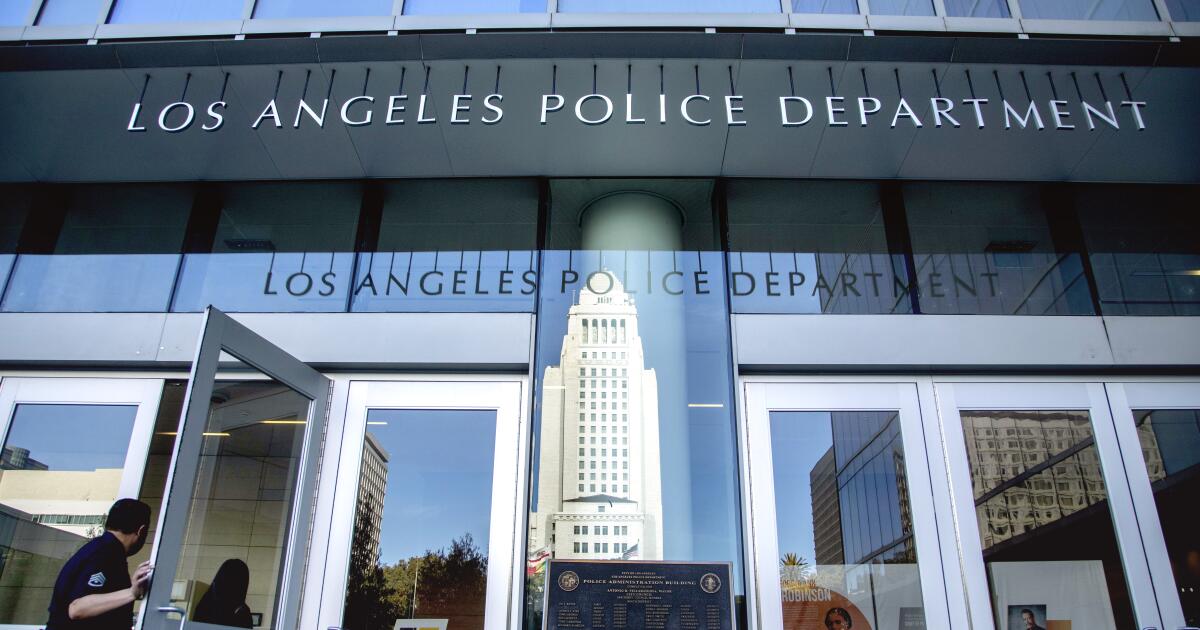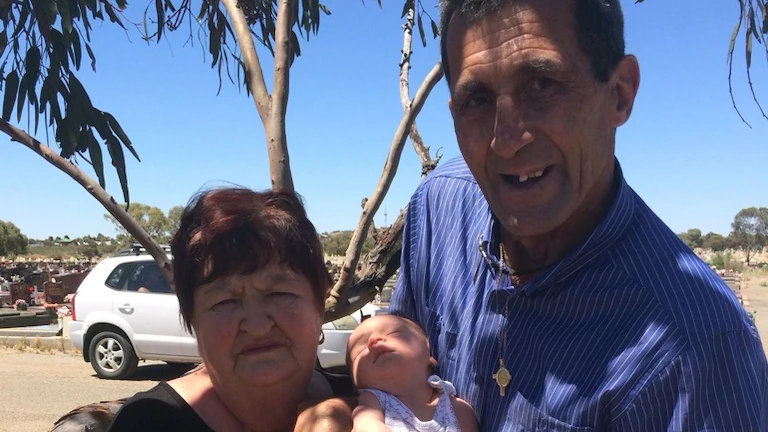Copyright Los Angeles Times

Good morning, and welcome to L.A. on the Record — our City Hall newsletter. It’s David Zahniser, with an assist from Noah Goldberg and Libor Jany, giving you the latest on city and county government. L.A.’s elected leaders took a dramatic step to cut police spending this year, chopping in half the number of officers that Mayor Karen Bass had been hoping to hire. In May, the City Council voted to give the LAPD just enough money to recruit 240 officers this year, down from the 480 requested by Bass. They did so not just to close a $1-billion budget shortfall, but also to prevent other city workers from being laid off. But on Tuesday, council members learned that the LAPD is on track to blow way past its budget allocation by adding 410 officers by summer 2026, the end of the fiscal year. That would mean hiring as many as 170 officers who lack funding in this year’s budget. Councilmember Tim McOsker voiced frustration, saying the LAPD’s overspending represents “everyone’s worst fear about a department running rogue.” “The budget has to mean something,” McOsker said during a Budget and Finance Committee meeting on Tuesday. Councilmember Katy Yaroslavsky was equally irritated. At the meeting, she asked City Administrative Officer Matt Szabo whether his office had identified the funds to hire the 170 extra officers. Szabo, a high-level budget official, said no. “At some point, we’re going to have to stop the hiring,” Yaroslavsky replied. “That’s all I’m going to say. If we can’t find the money, we have to stop the hiring once we hit the 240 that’s budgeted for in this year’s budget.” Police hiring was the biggest source of tension between Bass and the council during this year’s budget deliberations. Bass, who has seen the LAPD lose hundreds of officers since she won office in 2022, had been hoping, at minimum, to keep the department from shrinking significantly this year. Council members, on the other hand, were determined to avert the mayor’s proposal to lay off as many as 1,600 civilian workers — even if that meant scaling back police. Cutting the number of recruits ultimately freed up the money to save scores of jobs, including civilian crime specialists working at the LAPD. By the end of May, Bass was seriously considering a veto of the council’s budget. But by that point, the city was being upended by federal immigration raids, with helmet-wearing LAPD officers captured on video using tear gas while facing off against protesters in downtown Los Angeles. Bass ultimately signed the budget but, at the 11th hour, said she had reached an agreement with the council’s leadership — that is, Council President Marqueece Harris-Dawson — to find the additional money to restore the police hiring. In her announcement, Bass said that would happen within 90 days. For now, they haven’t come up with the money. Clara Karger, a Bass spokesperson, said in a statement that her office is working to find the additional funding. The city is preparing for next year’s World Cup, as well as other large-scale events, she said. “Crime is down and we are going to keep reducing crime and, obviously, hiring officers is a key component of a comprehensive approach,” Karger said. Police Chief Jim McDonnell, in an interview, said his agency’s recruiting numbers are “substantially up” after a long slump. Yet even if the council signs off on the additional hiring, sworn personnel will still drop by the end of the budget year, he said. “We’re going to still have a net loss, because we’re projected to lose [through] attrition between 500 and 600 people this year,” he said. On Tuesday, Yaroslavsky and McOsker said they want to hire more officers — but only if the city has the money to pay for them. They warned that if the additional funding isn’t there, overspending at the LAPD could force city leaders to contemplate cuts to other city jobs, which they oppose. “Either we find the money, new money, for the additional hires, or we need to have a serious conversation about following the budget,” Yaroslavsky said. Szabo told council members this week that, if the budget committee instructed him to, he would prepare a report identifying additional money to cover the cost of the extra 170 officers. “But we didn’t,” McOsker, an attorney who at one point represented the police union, quickly responded. “If we did, we would. But we didn’t. And it still came out the same.” The council’s budget advisors had previously projected that the city would need an extra $13.3 million to restore the 240 police hires sought by Bass. In 2026-27, the cost of those same officers would grow to about $60 million, since they would have worked a full year, the advisors said. The Los Angeles Police Protective League, which represents about 8,600 rank-and-file officers, supports the mayor’s effort to increase LAPD hiring. In a statement, the union’s board of directors said it is confident that Bass and the council will find the money to add the additional officers. “We have every confidence that city leaders will act with the same sense of urgency to identify funds for additional officers ... as they recently did to protect other city workers from layoffs,” the union said. State of play — END OF AN ERA: Bass announced this week that she is ending her declaration of emergency on homelessness, nearly three years after she announced it. Bass was facing pressure from council members to lift the emergency, which allowed her to award contracts and leases without bidding or council oversight. In her letter, she said she would not hesitate to reinstate the emergency if she finds that insufficient progress is being made on the crisis. — WHITHER ED1? The biggest question mark is the mayoral initiative known as Executive Directive 1, which fast-tracks the approval of 100% affordable housing projects and was made possible by the homelessness emergency. The council recently voted to make ED1 permanent law. But City Atty. Hydee Feldstein Soto still needs to finalize the legal language, and for now, it’s not clear how long that will take. The homelessness emergency expires Nov. 18. — POOR COMMUNICATION: L.A.’s emergency responders had communication breakdowns, inconsistent recordkeeping and poor coordination during their response to the Palisades fire, according to a new report issued by the LAPD. The report said communications were particularly poor between the LAPD and the city’s fire department on the wildfire’s first day. — LOOKING FOR TEXTS: Meanwhile, a federal grand jury issued a subpoena seeking text messages and other communications from the fire department regarding the Jan. 1 Lachman brush fire, which reignited six days later into the massive Palisades fire, according to an internal memo. The Times previously reported that a battalion chief ordered firefighters to pack up and leave the burn area the day after the Lachman fire, even though some firefighters said the ground was still smoldering. — MANY, MANY McOSKERS: Councilmember Tim McOsker is just one of the many McOskers who have had a toehold at City Hall. There’s daughter Nella McOsker, who heads the Central City Assn., the business group that weighs in on city policy, and brother Pat McOsker, who was at one point president of the firefighters union. There’s nephew Emmett McOsker at the tourism department and a few others beyond that. We spell it all out here, along with a helpful family tree. — CAPPING THE RENT: The council’s Housing and Homelessness Committee voted 3-2 to endorse Councilmember Nithya Raman‘s plan to limit rent increases in rent-stabilized apartment buildings to no more than 3%, down from 10%. (The city’s housing department had proposed lowering the cap to 5%.) The proposal heads to full council on Wednesday. — NO SOLICITORS: The Los Angeles County Board of Supervisors took the first step toward cracking down on “predatory” salespeople who they say hit up vulnerable residents seeking benefits from social services offices. The looming crackdown follows a Times investigation that found nine plaintiffs in sex abuse lawsuits against the county who said they were recruited outside the offices. — PRESS PROTECTIONS: Councilmember Ysabel Jurado is looking to change the way the city issues press credentials to journalists in the wake of the LAPD’s treatment of the news media at anti-ICE protests. Her proposal would, among other things, change the design of press passes so officers can more easily identify journalists. — WILL HE OR WON’T HE? Billionaire developer Rick Caruso still isn’t saying. The erstwhile mayoral hopeful might run for mayor or governor, but had no answer on either while speaking with podcaster Adam Carolla on Monday at a town hall at Caruso’s Americana at Brand mall in Glendale. Caruso asked the audience, which was filled with his supporters, to clap for the office they want him to run for. Carolla concluded that mayor won out by a small margin. “I’m getting pushed in a lot of different directions,” Caruso said. — HE’S BACK: Councilmember Curren Price returned to the council chamber after a monthlong absence. He suffered a “health-related incident” during an Oct. 1 press conference, with his staff saying at the time that he had been dehydrated. Price also made an appearance in court this week for a preliminary hearing in his ongoing corruption case. The hearing was delayed until Dec. 11. QUICK HITS Where is Inside Safe? The mayor’s signature program to address homelessness went to the area around 15th Street and St. Andrews Place, which is in the Harvard Heights section of Councilmember Heather Hutt’s district. On the docket next week: The council’s Public Safety Committee takes up the mayor’s nomination of Deputy Chief Jaime Moore to be the next fire chief on Wednesday. Stay in touch



